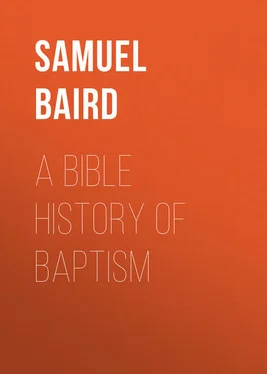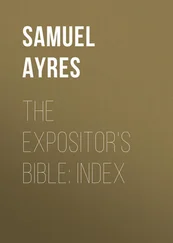Samuel Baird - A Bible History of Baptism
Здесь есть возможность читать онлайн «Samuel Baird - A Bible History of Baptism» — ознакомительный отрывок электронной книги совершенно бесплатно, а после прочтения отрывка купить полную версию. В некоторых случаях можно слушать аудио, скачать через торрент в формате fb2 и присутствует краткое содержание. Жанр: foreign_antique, foreign_prose, на английском языке. Описание произведения, (предисловие) а так же отзывы посетителей доступны на портале библиотеки ЛибКат.
- Название:A Bible History of Baptism
- Автор:
- Жанр:
- Год:неизвестен
- ISBN:нет данных
- Рейтинг книги:5 / 5. Голосов: 1
-
Избранное:Добавить в избранное
- Отзывы:
-
Ваша оценка:
- 100
- 1
- 2
- 3
- 4
- 5
A Bible History of Baptism: краткое содержание, описание и аннотация
Предлагаем к чтению аннотацию, описание, краткое содержание или предисловие (зависит от того, что написал сам автор книги «A Bible History of Baptism»). Если вы не нашли необходимую информацию о книге — напишите в комментариях, мы постараемся отыскать её.
A Bible History of Baptism — читать онлайн ознакомительный отрывок
Ниже представлен текст книги, разбитый по страницам. Система сохранения места последней прочитанной страницы, позволяет с удобством читать онлайн бесплатно книгу «A Bible History of Baptism», без необходимости каждый раз заново искать на чём Вы остановились. Поставьте закладку, и сможете в любой момент перейти на страницу, на которой закончили чтение.
Интервал:
Закладка:
Samuel John Baird
A Bible History of Baptism
“He shall baptize you with the Holy Ghost and with fire.” – Matt. iii, 17.
“This is that which was spoken by the prophet Joel: And it shall come to pass, in the last days, saith God, I will pour out of my Spirit upon all flesh.” – Acts ii, 16, 17.
PREFACE
Not only does the ordinance of baptism hold a position of pre-eminent honor, as being the door of entrance to all the privileges of the visible church, but it has been distinguished with a place of paramount importance and conspicuity in the transactions of the two grandest occasions in the history of that church, – in sealing the covenant at Sinai, by which Israel became the church of God, and the grace of Pentecost, by which the doors of that church were thrown open to the world. Proportionally interesting and significant is the ordinance, in itself, as symbolizing the most lofty, attractive and precious conceptions of the gospel, and unfolding a history of the plan of God in proportions of unspeakable interest, grandeur and glory. And yet, heretofore, the discussion of the subject has been little more than a disputation, alike uninteresting, inconclusive and unprofitable, concerning the word baptizo .
The present treatise is an attempt to lift the subject out of the low rut in which it has thus traversed, and to render its investigation the means of enlightening the minds and filling the hearts of God’s people with those conceptions, at once exalted and profound, and those high hopes and bright anticipations of the future which the ordinance was designed and so happily fitted to induce and stimulate.
Eighteen years ago, – in a catechetical treatise on “The Church of God, its Constitution and Order,” from the press of the Presbyterian Board of Publication, – the author enunciated the essential principles which are developed in this volume. In 1870, they were further illustrated in a tract on “The Bible History of Baptism,” which was issued by the Presbyterian Committee of Publication, in Richmond, Va. The reception accorded to these treatises has encouraged me to undertake the more elaborate disquisitions of the present work. The questions are sometimes such as require a critical study of the inspired originals of the holy Scriptures; and occasional illustrations are drawn from classic and other kindred sources. It has been my study so to conduct these investigations that while they should not be unworthy the attention of scholars, they may be intelligible to readers who are conversant with no other than our common English tongue, the richest and noblest ever spoken by man.
The circumstances and manner of the introduction of the rite of immersion into the post-apostolic church presented a rich and inviting field of further investigation. But the volume has already exceeded the intended limit; the Biblical question is in itself complete, and its authority is conclusive. To it, therefore, the present inquiry is confined.
The fruit of much and assiduous investigation and thoughtful study is now reverently dedicated to the glory of the baptizing office of the Lord Jesus. May he speedily arise and display it in new and transcendent energy; pouring upon his blood-bought church the Spirit of grace and consecration, of knowledge and aggressive zeal, of unity and power; baptizing the nations with his Spirit, and filling the world with the joy of his salvation and the light of his glory.
Covington, Ky., Feb. 8, 1882.
INTRODUCTION
The history of the ritual ordinances of God’s appointment is full of painful interest. Passing any reference to the times preceding the transactions of Sinai, – the institutions then given to Israel constituted a system of transparent, significance, perfect in the congruous symmetry and simplicity of the parts and comprehensive fullness of the whole, as setting forth the whole doctrine of God concerning man’s sin and salvation. Designed not only for the instruction of Israel, but for a light to the darkness of the surrounding Gentile world, its truths were embodied in symbols which spake to every people of every tongue in their own language. Copied in imperfect and perverted forms into the rites of Gentile idolatry, – although distorted, veiled and dislocated from their normal relations, they shed gleams of twilight into the gloom of spiritual darkness, and prepared the world for the dawning of the Sun of Righteousness, when he rose upon the nations. To multitudes of Israel, those ordinances were efficient means of eminent grace. With gladness, they saw therein, – as through a glass, darkly, it may be, but surely, – adumbrations of the salvation, grace and glory of the Messiah’s kingdom. And, if the fact be considered that at one of the darkest crises in Israel’s history, when the prophet cried, – “I, even I am left alone,” – God could assure him, – “Yet have I left seven thousand,” – we may possibly find occasion to revise our preconceptions concerning the history of the gospel in Israel. Still, undoubtedly there were multitudes in every generation of that people to whom the gospel preached in the ordinances brought no profit, for lack of faith. In their earlier history, indifference and neglect, and in the later, a self-righteous zeal for the mere outward rites and forms, were equally fatal. The splendor of the ritual, and the superfluous variety and frequency of the observances, were a poor substitute for faith toward God, and rectitude of heart and life. The result was that when Christ came, who was the end of all the rites and ordinances of the law, those who were the most strict and zealous in their observance were his betrayers and murderers.
When the Lord Jesus ascended the heavens, assumed the throne, and sent forth the gospel to the Gentiles, it was accompanied by two simple ordinances, which were eliminated out of those of the Levitical ritual, by the omission of the element of sacrifice. In them was symbolized and set forth the whole riches of that salvation which was represented in the more cumbrous forms of the Levitical system. By the supper, was signified the mystery of his atoning sufferings, and of the nourishment of his people by faith therein. By baptism, was shown forth the glory of his exaltation, and the sovereignty and power with which he sheds from his throne the blessings of his grace. But very soon, these ordinances, so beautiful and instructive in their simplicity, were corrupted through the misconceptions and ignorance of the teachers of the church. The Mosaic ritual, instead of being recognized, as Paul describes it, as a pattern or similitude of the things in the heavens, was regarded as a type of the New Testament church and of the ordinances therein administered. This one error became the inevitable cause of corruption and apostasy. Respecting the impending defection, Paul assured the Thessalonians, that the mystery of iniquity was already at work; and forewarned the elders of Ephesus of the coming of grievous wolves to rend the flock, and of apostasies among themselves, through the lust of an unhallowed ambition.
We have not the means, from the scanty and corrupted records which remain, of the age immediately following the apostles, of tracing the process of defection. But when, at length, the church emerges into the light of history, it is found to have realized a fatal transformation. The pastors and elders of the apostolic churches, from being simple preachers of the word, have become priests ministering at the altar, and offering better sacrifices than those made by the Aaronic line. For, while the latter offered mere animals, and the worshippers fed upon mere carnal food, the former, in the sacrament of the supper, the supposed antitype of those offerings, were believed to offer the body and blood of the Lord Jesus, and the people, in those elements, imagined themselves to receive and feed upon that very body and blood. So, too, while the “type baptisms” of the ancient ritual accomplished a mere purifying of the flesh, the baptism of water by the hands of the Christian ministry was regarded as the antitype of these, and considered effectual for accomplishing a spiritual regeneration, a renewing of the heart of the recipient.
Читать дальшеИнтервал:
Закладка:
Похожие книги на «A Bible History of Baptism»
Представляем Вашему вниманию похожие книги на «A Bible History of Baptism» списком для выбора. Мы отобрали схожую по названию и смыслу литературу в надежде предоставить читателям больше вариантов отыскать новые, интересные, ещё непрочитанные произведения.
Обсуждение, отзывы о книге «A Bible History of Baptism» и просто собственные мнения читателей. Оставьте ваши комментарии, напишите, что Вы думаете о произведении, его смысле или главных героях. Укажите что конкретно понравилось, а что нет, и почему Вы так считаете.












